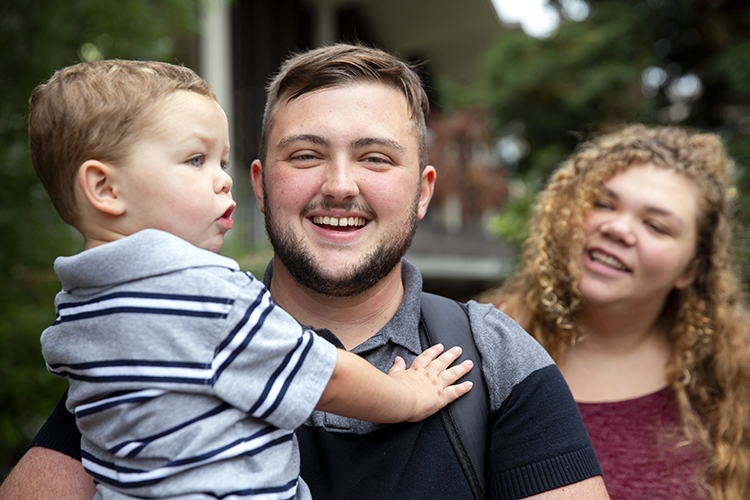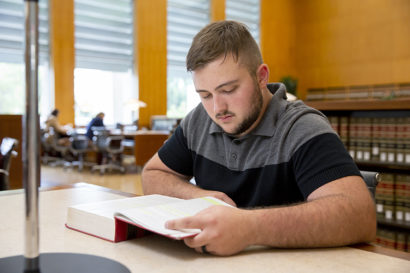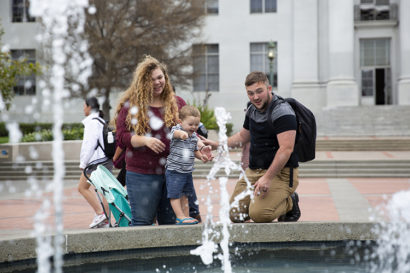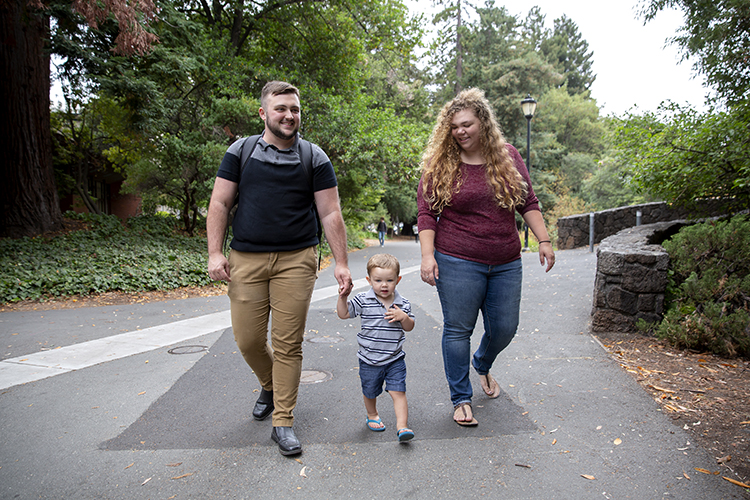The military isn’t out to ‘crush anybody who’s different’
New Berkeley Law student Blake Danser talks about transitioning gender as an airman in the Air Force
September 3, 2019
“I grew up just super dirt poor … about as poor as you can be in this country,” says first-year Berkeley Law student, Blake Danser. School was where Danser felt safe, where he thrived. “And then puberty hit, and I felt weird in a way that I couldn’t really identify,” he says. At the time, Blake was actually Amanda — a 14-year-old self-described tomboy. After seeing a transgender character in a TV show, Danser thought that maybe that’s why he felt different — because he was transgender. But a friend convinced him that he wasn’t, and Danser forgot about it until years later.
After high school, Danser realized he couldn’t afford college, so he joined the Air Force. “In the military, everything is very divided into male and female,” says Danser. “It just very much sank in that this was not right for me. I was not female.” For the next three years, he transitioned his gender — an experience he says was awkward at times, but was supported by the military. He also took online college courses throughout his active service, and received his bachelor’s degree in history.
Now, at Berkeley Law, Danser says he wants to help low-income communities, like the one he grew up in. And he wants to share his experience of what it’s like to be transgender and a veteran.

First-year Berkeley Law student, Blake Danser, walks on campus with his 2-year-old son, Henry, and his wife, Kayley. (UC Berkeley photo by Brittany Hosea-Small)
Read a written version of Fiat Vox episode #58: “The military isn’t out to ‘crush anybody who’s different'”:
“I grew up just super dirt poor. You know, about as poor as you can be in this country. Growing up that way, you realize how many things you don’t know about the laws of the country you live in.”
[Music: “Balti” by Blue Dot Sessions]
First-year law student Blake Danser was born in New Jersey and moved to Florida when he was 7. Things were chaotic at home — his mom was often busy, working and just figuring how to get by.
“So, I was kind of on my own,” says Blake. “I’m seven years older than my little sister. It was all very kind of scary, almost a monotonous scary. Like, it’s the same fear all the time. You don’t know what’s happening next, but there’s nothing you can do about it.”
School was a place where Blake felt safe, like he could shine.

Blake says that when he was growing up, school was safe haven for him. “School was where I excelled,” he says. “School was what I knew.” (UC Berkeley photo by Brittany Hosea-Small)
“I was always studious,” he says. “I was always in the books. You know, school, I think, was kind of a safe haven, looking back at it. At the time, I just saw it as something I was good at, so I liked to do it. But, Florida gives free breakfast to all public school students, so I knew I was eating. I was a free lunch kid. I knew I had meals at school and I think that kind of made it a safe place.
“And then puberty hit, and I felt weird in a way that I couldn’t really identify.”
At the time, Blake was actually Amanda — a 14-year-old self-described tomboy. Someone who hung out with the guys, talking cars and bikes and playing Nintendo 64.
“And then, I was watching a TV show, Degrassi, a trashy soap opera teenage TV show, and they had a transgender character. And, this is the most ridiculous thing I can admit as an adult, but I texted one of my friends and was like, ‘That’s it. I’m transgender, you know. That’s my reality. That’s why I feel so weird.’ And my friend said, ‘No, you’re not transgender. You’re just a tomboy.’ And I was so relieved as 14-year-old me that I wasn’t transgender, that I didn’t have to do all of that, that I forgot about it.”
And it really wasn’t an issue again until four years later, after he joined the military.
Transgender in the military
At 17, Blake graduated a semester early from high school. He was named salutatorian — the second-highest ranked graduate of his class.
He had already nearly earned an associate degree from the local community college, through a dual-enrollment program offered by the school district.
[Music: “Alchemical” by Blue Dot Sessions]
Blake had also met Kayley, someone he knew he wanted to spend his life with.

When Blake met Kayley five years ago, he knew he wanted to spend his life with her. The two got married right after they both turned 18. (UC Berkeley photo by Brittany Hosea-Small)
“I knew her for two weeks, and I told her we were going to get married,” says Blake. “And she told me I was crazy. And I was like, “No. You’ll see. We’re going to get married. I know I’m going to marry you.”
Blake enrolled in classes at St. John’s University in Queens, New York. But even with a full scholarship, he couldn’t afford the cost of housing. So, partway through the first semester, he dropped out and moved in with Kayley, who was living with her dad in upstate New York.
When the couple turned 18 a month later, they got married. Soon after, Blake decided to join the Air Force.
“I like to say that marrying my wife was the best thing I ever did, but joining the military was the smartest thing I ever did,” he says.
Not only would Blake be serving his country, which he felt compelled to do since seeing the twin towers fall as a young child on Sept. 11, 2001, he would also be able to continue his education, paid for by the military.
So, in 2015, the couple moved to North Carolina, where Blake was stationed at Pope Army Airfield.
Soon, the feelings that Blake had as a 14-year-old — the ones that came up watching the teen soap opera, Degrassi — came flooding back.
“In the military, everything is very divided into male and female,” says Blake. “Sir, ma’am. Guys over here, girls over there. It just very much sank in that this was not right for me. I was not female.”
[Music: “Allston Night Owl” by Blue Dot Sessions]
“So, I went to mental health and said I wanted to kill myself. I didn’t want to kill myself. I didn’t know how to express, in a way that people would listen, that I did not feel good.”
After talking more with a major in the mental health department, Blake realized he was transgender.
It was August 2016. Secretary of Defense Ash Carter had just announced on June 30 that transgender people would be allowed to openly serve in the U.S. Armed Forces.
“Our mission is to defend this country,” said Carter, at the June 30 press conference. “And we don’t want barriers unrelated to a person’s qualification to serve preventing us from recruiting or retaining the soldier, sailor, airman or Marine who can best accomplish the mission.”
Before that, since 1960, there’d been a ban on all transgender people serving and enlisting in the U.S. military.
I would say everybody [in the military] wants to be as inclusive as they can be. … You know, we’re all in this together, in a sense. So, if you’re not being supportive, you’re kind of ostracized. You’re the bad guy.
Because Carter had just made the announcement, there weren’t any strict regulations in place yet. So, Blake worked with his first sergeant to figure out the best steps to take for himself.
“I’m grateful to have been in that sweet spot of ‘Just figure it out’ because I was able to get on hormones very quickly,” says Blake. “While I was in the beginning of my transition, everyone was kind of on this, ‘I don’t know. Let’s be as supportive as possible because we’re allowed to be.’”
“Was it that feeling, that people want to be supportive, generally, and if the rules say they can be, then they will be?” I ask.
“Yeah, absolutely,” says Blake. “I would say everybody [in the military] wants to be as inclusive as they can be. People might not personally support it. A big critique that I heard, that I agree with on some level, is at certain points in your transition, you’re non-deployable. And if you’re non-deployable, then you’re not what the military needs you to be.
“So, you do, in fact, have a medical issue that prevents you from being in the military. And, to a point, I understand that and I agree with it. But even if people feel very strongly about it, they’re going to be openly supportive because that’s kind of how it is. Everyone is supportive. I don’t want to say everyone has to be supportive, but you kind of do.
“You know, we’re all in this together, in a sense. So, if you’re not being supportive, you’re kind of ostracized. You’re the bad guy.”
Blake worked as an airman — an aerospace ground equipment craftsman, to be exact. He maintained and repaired parts that helped the plane work, like, generators, floodlights, heaters, air conditioners, things like that.

By the time Blake served his four-year term in active military service, he had earned a bachelor’s degree in history. (UC Berkeley photo by Brittany Hosea-Small)
Over the next three years in the military, Danser was actively transitioning from female to male. At first, he had to wear female uniforms and have a female haircut. But, as soon as the military could have him under male regulations, it did.
Blake says the thing that was the most awkward wasn’t how he was treated, but the possibility that someone might treat him disrespectfully.
“There was almost this expectation that someone would be nasty to me in some way, and that was, honestly, the most awkward part,” he says. “I went to Airman Leadership School — I was a class leader — and unfortunately, we had to get someone removed from the class. And I went to visit my shop to talk to the younger airman, and my flight chief pulled me in and said, ‘I heard someone was being unfortunate to you due the he or she type thing. Was that an issue?’
“And I was like, ‘No, no. It was a normal Air Force issue. Not everything in my life is because I’m transgender.'”
[Music: “A Rush of Clear Water” by Blue Dot Sessions]
“But other than that kind of awkwardness, it really went as well as it could.”
While Blake was working as an airman, he was also a full-time college student, taking online courses through the University of Maryland. Every chance he got, he would put time toward his classes — during lunch, at night, on the weekends. He also tested out of several classes.
In June 2019, at age 22, Blake had received a bachelor’s degree in history and had served his four-year term in active military service. And, by this time, he and Kayley had a 2-year-old son, Henry, who would become the light of their lives.

Blake and Kayley moved to Berkeley from North Carolina in August, with their 2-year-son, Henry. Kayley is taking prerequisites for nursing school and Henry just started at his new daycare. (UC Berkeley photo by Brittany Hosea-Small)
[Music: “Sage the Hunter” by Blue Dot Sessions]
Three months later, in August, Blake started at Berkeley Law, a school he says will give him the opportunity to get out and help people who need it most. To become someone he wished he knew as a young kid growing up in Florida.
A commitment to helping low-income communities
When Blake found out he got into Berkeley Law, he knew it was the school for him.
“Every law school says, ‘Oh, we care very much about public interest, and we care about helping the community.’ But, Berkeley’s out there doing it. They’re not just talking about it. It’s not just a page in a pamphlet. It offers actual, real, tangible opportunities,” says Blake.
He’s especially interested in participating in Student-Initiated Legal Services Projects (SLPS), community-based student pro bono projects open to all Berkeley Law students.
There’s one clinic that’s already caught his attention, the Contra Costa Reentry Project. It assists the Contra Costa County Office of the Public Defender with its Clean Slate practice, helping to remove the barriers that a prior conviction can present to employment, housing, public benefits and family reunification.

A big reason Blake decided to attend Berkeley Law was the school’s commitment to helping communities that need it most. (UC Berkeley photo by Brittany Hosea-Small)
“American prisons are meant to punish, whereas, if you look at successful corrections programs, they’re meant to rehabilitate,” Blake says. “If you take someone who’s committed a crime and put them in jail, then take them out, and they can’t get a job, and they can’t get benefits, they can’t get funding to go to school, what do you expect them to do, other than commit more crimes? They have to survive somehow, and you’ve never given them the opportunity to do so. So, I’m really excited to see how I can get involved with something to make that a little bit easier on people.”
And, he says, he wants to help communities like the one he grew up in.
“There were so many situations that we were in that we could’ve gotten out of, if we had just known that the law was on our side,” he says. “So, I want to become a lawyer, so that I can go back to those low-income neighborhoods, these really bad areas where people just get the raw end of the deal because they don’t know any better. And I want to be able to go back there and help them in issues with their landlords, in issues with the police, things where people just don’t know what their rights are.”
[Music: “Solage” by Blue Dot Sessions]
Every law school says, ‘Oh, we care very much about public interest, and we care about helping the community.’ But, Berkeley’s out there doing it. They’re not just talking about it. It’s not just a page in a pamphlet. It offers actual, real, tangible opportunities.
Before Blake came to Berkeley, he wasn’t sure he wanted to be open about being transgender. Maybe, he thought, he could just live without that being a part of his public identity.
But the more he thought about it, the more he realized that it was important that he was open about who he was. And he wanted to share his experience of what it’s like to be transgender and a veteran.
“I want to go into more liberal spaces — I consider myself an independent — but I want to go into more liberal spaces, and be open about both sides of myself, so I don’t get written off as one or the other. I want to show that you can be both,” he says. “You can fall into this, tends-to-be-oppressed, tends-to-be-discriminated against group, but also be in the military. You know, it’s not this big, bad machine that’s here to crush anybody who’s different. I want to share that experience.”
But, Blake admits, it’s different for transgender people in the military today.
As of April 11, 2019, transgender personnel in the U.S. military are no longer allowed to serve or enlist, except if they serve in their birth gender, had been grandfathered in before April 12, 2019, or were given a waiver.
The military follows regulations, he says, but it’s not out of spite or intolerance for people who are different. It’s just because that’s the way the military runs.
With the G.I. Bill paying his tuition and providing a housing stipend, and with Berkeley covering his out-of-state tuition because he just got out of the military, school is back to how he remembers it when he was growing up — a safe haven where he can thrive.
In a perfect world, Blake sees himself working as a public defender or at a nonprofit organization. But he’s open to seeing where his new path takes him.
“They say that you go in thinking you want to do one thing, and through the experiences that Berkeley offers, it could take you in a completely different direction that you never expected,” he says.
For now, he says, he’s just excited to see where he ends up.

Blake says having a newborn baby while serving in the military was “an absolute circus.” But he wouldn’t trade it for the world. “He’s my little dude,” he says. (UC Berkeley photo by Brittany Hosea-Small)